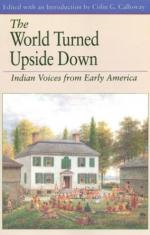
|
| Name: _________________________ | Period: ___________________ |
This test consists of 15 multiple choice questions and 5 short answer questions.
Multiple Choice Questions
1. The Indian Nonintercourse Act was passed by the United States Congress beginning in what year?
(a) 1790.
(b) 1769.
(c) 1758.
(d) 1795.
2. In Chapter 4, a Cayuga chief described what tribe as warlike and treacherous, when in reality they were peace-loving?
(a) The Apaches.
(b) The Catawbas.
(c) The Cherokee.
(d) The Delaware Indians.
3. Joseph Mittark was accused of illegitimately selling the lands of his people to whom?
(a) John Heckewelder.
(b) John Eliot.
(c) Thomas Dongan.
(d) Joseph Brant.
4. Colonel William Crawford was tortured and burnt at the stake by American Indians in retaliation for what incident?
(a) The Braddock expedition.
(b) The Gnadenhutten massacre.
(c) The Treaty of Fort Stanwix.
(d) The French and Indian War.
5. In what year did a Delaware chief named John Killbuck make a speech correctly doubting that the white man will be satisfied with the Ohio River boundary?
(a) 1768.
(b) 1771.
(c) 1769.
(d) 1802.
6. In what year was the Treaty of Fort Stanwix concluded between the Iroquois and English delegate Sir William Johnson?
(a) 1768.
(b) 1746.
(c) 1737.
(d) 1802.
7. In what year were 96 Delaware Indians murdered by American militia because the militia believed the Indians were plotting against them?
(a) 1778.
(b) 1776.
(c) 1777.
(d) 1782.
8. A speech was given by what Oneida Indian in Chapter 4, promising to uphold the peace between the tribe and the English, but questioning the English for using Indians to fight their wars for them?
(a) La Barre.
(b) Cheda.
(c) Garangula.
(d) Gachadow.
9. Chief Pontiac was born in approximately what year?
(a) 1720.
(b) 1763.
(c) 1708.
(d) 1700.
10. What refers to the crime of falsely making or altering a writing by which the legal rights or obligations of another person are apparently affected?
(a) Allimony.
(b) Bribery.
(c) Forgery.
(d) Larceny.
11. What refers to a writing or document executed under seal and delivered to effect a conveyance, especially of real estate?
(a) Warranty.
(b) Contraband.
(c) Forgery.
(d) Deed.
12. In the first text from Chapter 5, Oneida Indians express their desire to remain neutral in the conflict in a speech to whom?
(a) Jonathan Trumbull.
(b) George Washington.
(c) Joseph Brant.
(d) Thomas Jefferson.
13. One instance of land abuse was the "guardian system," put in place by Massachusetts in what year?
(a) 1737.
(b) 1746.
(c) 1768.
(d) 1711.
14. The Walking Purchase was a purported agreement between the Penn family and what native tribe?
(a) The Delaware Indians.
(b) The Cherokee Indians.
(c) The Apache Indians.
(d) The Iriquois Indians.
15. In Chapter 4, a speech from 1752 was made by an Abenaki Indian named what to a Massachusetts emissary?
(a) Atiwaneto.
(b) Garangula.
(c) Cheda.
(d) Gachadow.
Short Answer Questions
1. Penobscot participated in a land negotiation for an area called what in present-day Maine?
2. The Treaty of Fort Pitt was signed on what date?
3. Where was Colonel William Crawford born?
4. In a speech from 1756, the leaders of what tribe, known for their ferocious fights against the French, plead for support in fighting the French?
5. The first text reprinted in Chapter 3 is a "Act of Submission" written by what tribe?
|
This section contains 473 words (approx. 2 pages at 300 words per page) |

|




